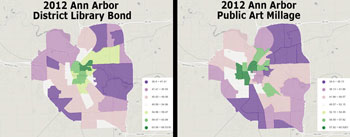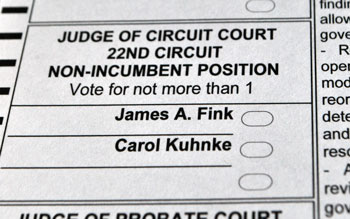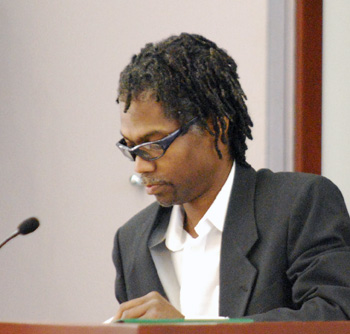A Saturday, Jan. 14 meeting of Ann Arbor Democrats drew a total of four candidates for judgeships on two different Michigan courts – the 22nd circuit court of Washtenaw County and Michigan’s supreme court. Although positions on both courts are elected on non-partisan ballots, election outcomes are generally acknowledged to be decided at least to some extent along party lines.

U.S. Rep. John Dingell (D-District 15) paid a visit to the Jan. 14 meeting of the Ann Arbor City Democratic Party.
Appearing at the meeting of the Ann Arbor City Democratic Party to establish that they’d be asking for support in the upcoming August primary, for election to the 22nd circuit court, were local attorneys Carol Kuhnke, Doug McClure and Erane Washington.
The non-partisan Aug. 7, 2012 primary will winnow the field down to two candidates for the one position that will be open on the 22nd circuit court – currently held by Melinda Morris, who is retiring. Candidates have until May 1 to file their nominating petitions.
For the position on the Michigan supreme court, the partisan connection is overt. One mechanism for ballot access is for candidates to be nominated through the convention of a political party. Three nominations can be made this year to the seven-member court. And Democrats will make their selection of nominees at a March 10, 2012 endorsement convention to be held at Detroit’s Cobo Center.
So last Saturday, Bridget Mary McCormack introduced herself to Ann Arbor Democrats as a candidate for one of the three Democratic Party endorsements for supreme court justice. She’s a professor of law at the University of Michigan, and co-director of the Michigan Innocence Clinic.
Also related to state-level party politics at the Saturday morning gathering was some measure of frustration expressed by Debbie Dingell. The wife of U.S. Rep. John Dingell (D-District 15) told the local Ann Arbor Democratic Party group that the state’s party leadership needs to give clearer direction to party members about the presidential primary to be held on Feb. 28.
The need for any direction stems from the appearance on the primary ballot of President Barack Obama’s name, despite the fact that he is not opposed in the primary, and that state party leaders did not want Obama’s name to appear. Michigan Democrats plan to select Obama as their nominee at a May 5 caucus. As it currently stands, national and state party rules don’t allow voters to participate both events – primary and caucus.
For his part, John Dingell quipped from his seat in the audience, “I’ve never voted in a Republican primary, and I ain’t about to start!” Earlier in the meeting, Dingell had dished out a well-polished series of pokes at the Republican Party, which included a lampooning of the field in the GOP presidential primary. Of the candidates, Newt Gingrich probably got the sharpest end of Dingell’s humor, when the Michigan congressman quipped, “As my old daddy used to say, even a blind hog can find an acorn.” Dingell also ticked through a number of achievements of Democrats in the last two years – including support for the auto industry and securing food safety.
Among the various volunteer sign-up sheets circulated at Saturday’s meeting was one to indicate willingness to help with the presidential campaign locally. In connection with that, David Cahill explained that the local party organization is now using the voter activation network (VAN) as its database.
The meeting was also an occasion for local candidates for office to introduce themselves. On the state level, Adam Zemke and Bob Davidow introduced themselves as candidates for District 55 of the Michigan house of representatives.
Incumbent county commissioners Conan Smith (new District 9) and Yousef Rabhi (new District 8) are both seeking re-election in the newly-configured nine districts – the board currently reflects representation of 11 districts. And Andy LaBarre told the gathering that he’s seeking election in the new District 7.
Also on the county level, Kathy Wyatt, executive assistant from the sheriff’s office, announced that sheriff Jerry Clayton would be seeking re-election this year. The sheriff’s presence was required at a job fair that morning – new dispatchers were being hired in connection with retirements and the consolidation of dispatch operations at the county and the city of Ann Arbor.
Incumbent city councilmember Tony Derezinski (Ward 2) announced to meeting attendees that he’s running for re-election. Sabra Briere (Ward 1) also attended the meeting, but her council seat is not up for election this time around. She was re-elected last year – unopposed in both the primary and the general election. [Full Story]







